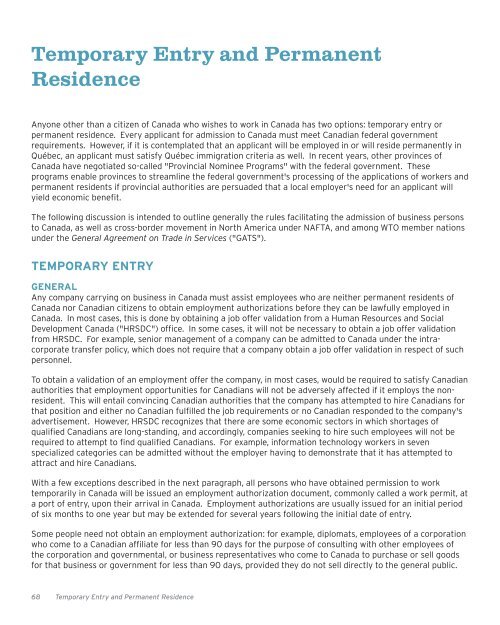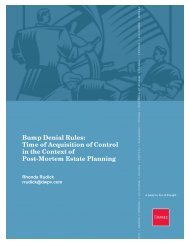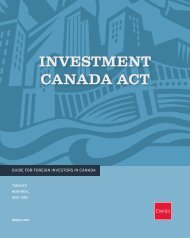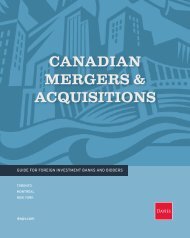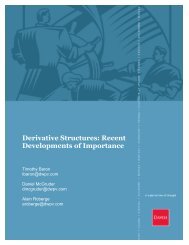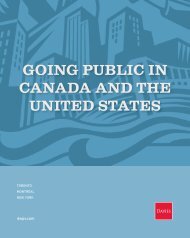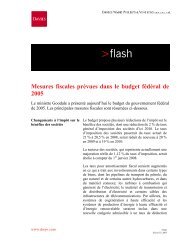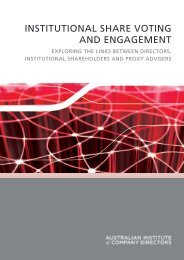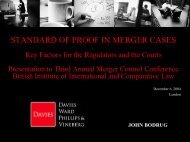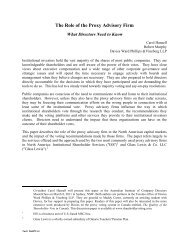doing business in canada - Davies Ward Phillips & Vineberg LLP
doing business in canada - Davies Ward Phillips & Vineberg LLP
doing business in canada - Davies Ward Phillips & Vineberg LLP
- No tags were found...
Create successful ePaper yourself
Turn your PDF publications into a flip-book with our unique Google optimized e-Paper software.
Temporary Entry and PermanentResidenceAnyone other than a citizen of Canada who wishes to work <strong>in</strong> Canada has two options: temporary entry orpermanent residence. Every applicant for admission to Canada must meet Canadian federal governmentrequirements. However, if it is contemplated that an applicant will be employed <strong>in</strong> or will reside permanently <strong>in</strong>Québec, an applicant must satisfy Québec immigration criteria as well. In recent years, other prov<strong>in</strong>ces ofCanada have negotiated so-called "Prov<strong>in</strong>cial Nom<strong>in</strong>ee Programs" with the federal government. Theseprograms enable prov<strong>in</strong>ces to streaml<strong>in</strong>e the federal government's process<strong>in</strong>g of the applications of workers andpermanent residents if prov<strong>in</strong>cial authorities are persuaded that a local employer's need for an applicant willyield economic benefit.The follow<strong>in</strong>g discussion is <strong>in</strong>tended to outl<strong>in</strong>e generally the rules facilitat<strong>in</strong>g the admission of <strong>bus<strong>in</strong>ess</strong> personsto Canada, as well as cross-border movement <strong>in</strong> North America under NAFTA, and among WTO member nationsunder the General Agreement on Trade <strong>in</strong> Services ("GATS").TEMPORARY ENTRYGENERALAny company carry<strong>in</strong>g on <strong>bus<strong>in</strong>ess</strong> <strong>in</strong> Canada must assist employees who are neither permanent residents ofCanada nor Canadian citizens to obta<strong>in</strong> employment authorizations before they can be lawfully employed <strong>in</strong>Canada. In most cases, this is done by obta<strong>in</strong><strong>in</strong>g a job offer validation from a Human Resources and SocialDevelopment Canada ("HRSDC") office. In some cases, it will not be necessary to obta<strong>in</strong> a job offer validationfrom HRSDC. For example, senior management of a company can be admitted to Canada under the <strong>in</strong>tracorporatetransfer policy, which does not require that a company obta<strong>in</strong> a job offer validation <strong>in</strong> respect of suchpersonnel.To obta<strong>in</strong> a validation of an employment offer the company, <strong>in</strong> most cases, would be required to satisfy Canadianauthorities that employment opportunities for Canadians will not be adversely affected if it employs the nonresident.This will entail conv<strong>in</strong>c<strong>in</strong>g Canadian authorities that the company has attempted to hire Canadians forthat position and either no Canadian fulfilled the job requirements or no Canadian responded to the company'sadvertisement. However, HRSDC recognizes that there are some economic sectors <strong>in</strong> which shortages ofqualified Canadians are long-stand<strong>in</strong>g, and accord<strong>in</strong>gly, companies seek<strong>in</strong>g to hire such employees will not berequired to attempt to f<strong>in</strong>d qualified Canadians. For example, <strong>in</strong>formation technology workers <strong>in</strong> sevenspecialized categories can be admitted without the employer hav<strong>in</strong>g to demonstrate that it has attempted toattract and hire Canadians.With a few exceptions described <strong>in</strong> the next paragraph, all persons who have obta<strong>in</strong>ed permission to worktemporarily <strong>in</strong> Canada will be issued an employment authorization document, commonly called a work permit, ata port of entry, upon their arrival <strong>in</strong> Canada. Employment authorizations are usually issued for an <strong>in</strong>itial periodof six months to one year but may be extended for several years follow<strong>in</strong>g the <strong>in</strong>itial date of entry.Some people need not obta<strong>in</strong> an employment authorization: for example, diplomats, employees of a corporationwho come to a Canadian affiliate for less than 90 days for the purpose of consult<strong>in</strong>g with other employees ofthe corporation and governmental, or <strong>bus<strong>in</strong>ess</strong> representatives who come to Canada to purchase or sell goodsfor that <strong>bus<strong>in</strong>ess</strong> or government for less than 90 days, provided they do not sell directly to the general public.68 Temporary Entry and Permanent Residence


